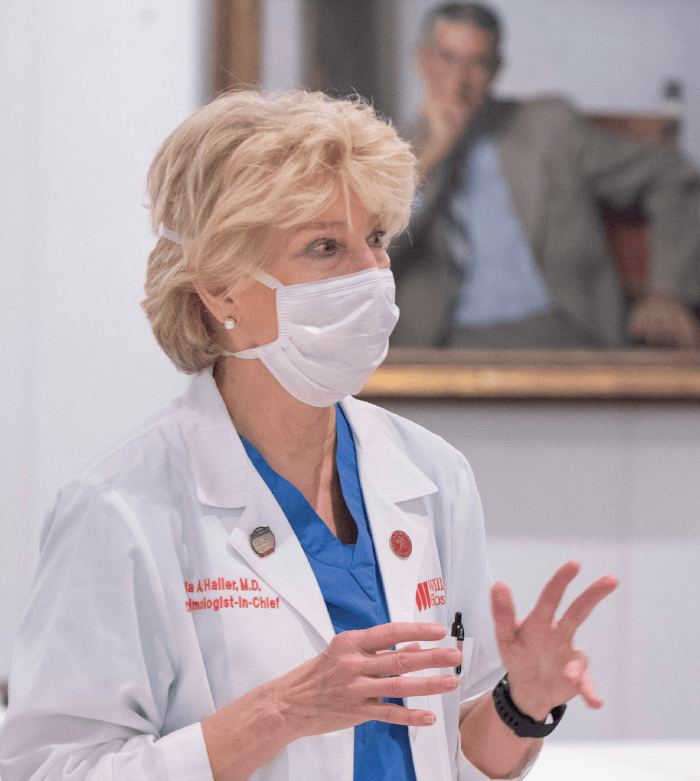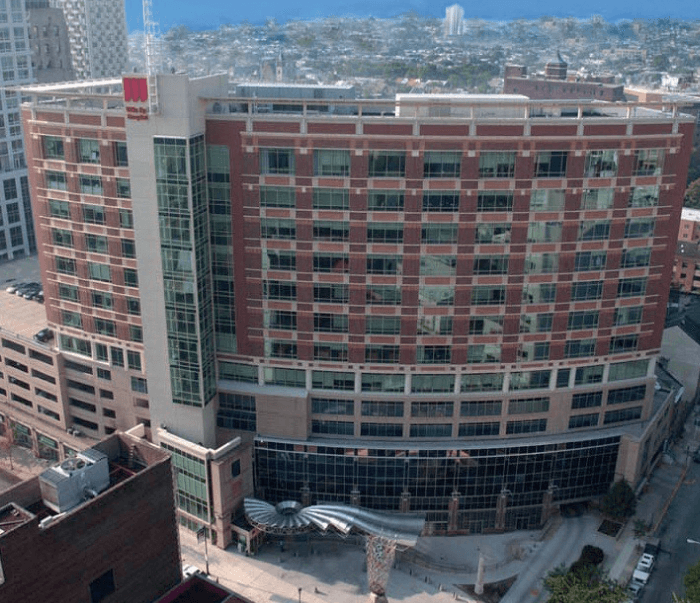
It is a privilege to be Ophthalmologist-in-Chief at Wills Eye Hospital, and this has brought with it a generous invitation from The Ophthalmologist to tell the story of how we were affected by the pandemic. I feel tremendously lucky to give the Wills roar; the lionheart that continues to power us through this long fight beats in the courageous breasts of all Wills’ faculty and staff.
We’ve been on a daunting journey over the last months, but it is one that has filled me with pride in our team’s alert, nimble and evidence-based response to the challenges presented by the unprecedented events.
I happened to be reading the Erik Larson bestseller, “The Splendid and the Vile: A Saga of Churchill, Family and Defiance During the Blitz,” just as the initial wave of SARS-CoV-2 was hurtling around the world and engulfing Boston and New York; cities not far to the north of our Wills Eye Hospital home in Philadelphia. To me, it felt as though there were uncanny parallels between the unrelenting bombardment of London in the 1940s and the incoming early reports of a virus that was hitting our cities, causing us to hunker down. Shops were shuttered, traffic was absent, and we were facing a foe that seemed as menacing to me as any squadron of approaching Nazi Messerschmitts. The COVID-19 Blitz was upon us.
When the writing was on the wall
Wills was with the first hospitals in the city to halt all but urgent and emergent patient care, which necessitated closing our network of ambulatory surgical centers and funneling patients to our main Walnut Street campus. Here, we instituted stringent safety measures, closing entrances so that all entered through one access point for careful screening, hand sanitization, temperature checks, and masking. Our friendly elevator attendant even wiped down the buttons with disinfectant, ensuring not only that sanitation measures were in place at that first entry point, but also that a reassuringly warm welcome was provided to understandably anxious patients.
The writing was on the wall from that first weekend in March, when New York City hospitals were deluged with patients. The immediate response of CEO Joe Bilson, Facilities Manager Mike Wurster and their teams was to ensure that all seating was distanced and plexiglass barriers were installed at welcoming desks. In constant communication with local, state, and federal authorities, they, along with COO Michael Allen, CNO Greg Passanante and their teams, drew up new policies and procedures to allow our high standards of care to continue, while prioritizing safety of patients and staff amidst this new threat. We monitored CDC and city and state Department of Health guidelines, urgently digesting every available publication so as to adopt the strategies that were beginning to show successful transmission containment, particularly those early reports from Singapore and Hong Kong, as well as those from Boston, which showed the preservation of staff health with the use of surgical masks, distancing, and handwashing.
We maximized our PPE supplies, and right-sized our staffing through a host of strategies that preserved employment and benefits. Joe Bilson, Michael Allen, and our finance team worked through the nights to make sure that all available grant support was identified, the cumbersome data-intensive applications completed and submitted at the earliest opportunity. The outcome? During Philadelphia’s surge in COVID-19 cases from March 15 through May 15, Wills surgeons were able to perform almost 700 urgent and emergent surgical procedures, they saw thousands of patients, and completed thousands of procedures, such as intravitreal injections, all while maintaining a 100 percent safety record. No case of coronavirus was contracted at Wills by any patient or staff member – a safety bar we strive to clear each and every day.
Our finest hour
Those points only sketch the barest outline of the phenomenal work that has been done – every day our team has labored in fluctuating conditions as information changed on a daily, sometimes hourly, basis.
As I reflected on the oft-used term “unprecedented,” the example of the brave Londoners during the Blitz often came to mind, as did other examples from history. In "A Journal of the Plague Year" of 1665, Defoe wrote: “Yet all looked deeply concerned; and as we saw it apparently coming on, so every one looked on himself and his family as in the utmost danger. Were it possible to represent those times exactly to those that did not see them, and give the reader due ideas of the horror that everywhere presented itself, it must make just impressions upon their minds, and fill them with surprise. London might well be said to be all in tears.”
All in tears – how many times did we, stressed and worried, tear up at the thought of our endangered families, friends, and patients? But with COVID-19, we learned that even those tears could be infected! And then, as if a global pandemic were not enough, suddenly a terrible tragedy in Minneapolis ignited the smoldering fuse of outrage at ingrained social and racial inequities, and we found ourselves in a city filled with protests and marches, and escalating police presence and threats of violence. Helicopters plied the air outside my 15th floor office window.
The response of the Wills Eye Hospital staff on the front line of this battle – from the facilities workers to our security guards to all those involved in making sure patient care was seamless – made me reach for the great inspiring tributes that echo down the corridors of history. This (and it seems Churchill may also have agreed) might well be Wills’ finest hour. Our stalwart line of residents and fellows, marshalled into teams so that if one fell ill, the next unexposed unit could take their place, were akin to Shakespeare’s Band of Brothers, and Sisters.
As the curve flattened in Philadelphia, Churchill’s words again came to mind, as the tide of war began to turn for Britain in 1942: “Now this is not the end. It is not even the beginning of the end. But it is, perhaps the end of the beginning.” At Wills, we needed to gear back up to care for our huge volume of patients with renewed safety, while also dealing with the backlog of patients with medically necessary and time-sensitive problems. And we did.
Black clouds, silver linings
In the months since May, I have been struck so often by the grievous consequences of the many delays in care due to COVID-19 – both for patients who had no access because of closed offices and limited resources, and those whose fear of venturing out to a healthcare facility precluded evaluation. The delayed cancer diagnosis of a 90-year-old patient of mine who endured months of hand motions vision as lymphoma infiltrated both eyes and clouded her vitreous. A grandmother with Terson’s Syndrome who suffered for five months groping her way around her daughter’s home before vitrectomies in July and August restored her vision.
The visual consequences of this pandemic will take many years to play out and understand. Wills physicians and researchers have already begun a host of analyses – already published or in press – describing the impact of the pandemic on our emergency room, trauma work, clinical case load, the types of surgery required, and the psychological stresses and concerns of the frontline workforce, amongst others.
Some of this scholarship focuses on one of the silver linings of the huge black COVID-19 cloud, and that is the rapid and significant advances that we made in delivering telemedicine to those patients who could not be seen in person. Other improvements that will stand the test of time include streamlining patient portals, optimizing wait times, and diminishing flow of people through the building, with a focus on clinic and OR operations. Other benefits may turn out to be more engaging online learning experiences, high impact residency and fellowship and CME virtual training experiences, as well as more efficient and individualized ways to use wonderful resources like our Measey Ophthalmic Surgical Training (MOST) laboratory.
And I know many of us are asking ourselves whether or not we need to travel as much as we did so routinely in the past, or if we can accomplish more by focusing our efforts at home and using technology to connect us to our colleagues and the world.
Toward justice and equality
Finally, this crucible of pandemic, anxiety, and uncomfortable but necessary revelations about unequal treatment of our fellow citizens has inspired a renewed determination that I see at Wills, across our nation, and beyond.
A challenging year as no other in memory, where 2020, The Year of the Eye, morphed into a modern Plague Year, further stressed by social and political unrest, and both challenged and uplifted by wrenching, important discussions targeting societal inequity and the hard work needed to correct it. Martin Luther King Jr.'s famous words continue to give hope: “The arc of the moral universe is long, but it bends toward justice.”
May the terrible cost of this worldwide disaster renew us in our determination to stay the course, keep our patients and staff safe, never yield in our commitment to excellence, and work relentlessly towards a more just world, free of healthcare disparities, with a professional workforce representative of the population we serve, and with equal and perfect vision for all. Now that would be something to roar about!

